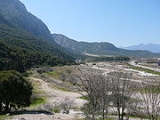
Battle of Thermopylae
Overview
Ancient Greece
Ancient Greece is a civilization belonging to a period of Greek history that lasted from the Archaic period of the 8th to 6th centuries BC to the end of antiquity. Immediately following this period was the beginning of the Early Middle Ages and the Byzantine era. Included in Ancient Greece is the...
city-state
City-state
A city-state is an independent or autonomous entity whose territory consists of a city which is not administered as a part of another local government.-Historical city-states:...
s, led by King Leonidas of Sparta, and the Persian Empire
Achaemenid Empire
The Achaemenid Empire , sometimes known as First Persian Empire and/or Persian Empire, was founded in the 6th century BCE by Cyrus the Great who overthrew the Median confederation...
of Xerxes I over the course of three days, during the second Persian invasion of Greece
Second Persian invasion of Greece
The second Persian invasion of Greece occurred during the Greco-Persian Wars, as King Xerxes I of Persia sought to conquer all of Greece. The invasion was a direct, if delayed, response to the defeat of the first Persian invasion of Greece at the Battle of Marathon which ended Darius I's attempts...
. It took place simultaneously with the naval battle at Artemisium
Battle of Artemisium
The Battle of Artemisium was a series of naval engagements over three days during the second Persian invasion of Greece. The battle took place simultaneously with the more famous land battle at Thermopylae, in August or September 480 BC, off the coast of Euboea and was fought between an alliance of...
, in August or September 480 BC
480 BC
Year 480 BC was a year of the pre-Julian Roman calendar. At the time, it was known as the Year of the Consulship of Vibulanus and Cincinnatus...
, at the pass of Thermopylae
Thermopylae
Thermopylae is a location in Greece where a narrow coastal passage existed in antiquity. It derives its name from its hot sulphur springs. "Hot gates" is also "the place of hot springs and cavernous entrances to Hades"....
('The Hot Gates'). The Persian invasion was a delayed response to the defeat of the first Persian invasion of Greece
First Persian invasion of Greece
The first Persian invasion of Greece, during the Persian Wars, began in 492 BCE, and ended with the decisive Athenian victory at the Battle of Marathon in 490 BCE. The invasion, consisting of two distinct campaigns, was ordered by the Persian king Darius I primarily in order to punish the...
, which had been ended by the Athenian
Classical Athens
The city of Athens during the classical period of Ancient Greece was a notable polis of Attica, Greece, leading the Delian League in the Peloponnesian War against Sparta and the Peloponnesian League. Athenian democracy was established in 508 BC under Cleisthenes following the tyranny of Hippias...
victory at the Battle of Marathon
Battle of Marathon
The Battle of Marathon took place in 490 BC, during the first Persian invasion of Greece. It was fought between the citizens of Athens, aided by Plataea, and a Persian force commanded by Datis and Artaphernes. It was the culmination of the first attempt by Persia, under King Darius I, to subjugate...
in 490 BC
490 BC
Year 490 BC was a year of the pre-Julian Roman calendar. At the time, it was known as the Year of the Consulship of Camerinus and Flavus...
.

